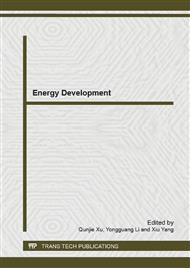p.2077
p.2083
p.2088
p.2095
p.2101
p.2107
p.2112
p.2117
p.2122
Application of Improved Ant Colony Optimization on Economical Operation of Automatic Generation Control Units in Hydropower Station
Abstract:
This paper proposed an improved ant colony optimization(ACO), to solve the economical operating dispatch of automatic generation control(AGC) units in hydropower station. The improved ant colony algorithm PSO-ACO imported particle swarm optimization is put forward. Both of the global convergence performance and the effectiveness of this algorithm is improved by using self-adaptive parameters and importing PSO to optimize the current ant paths. The mathematical description and procedure of the PSO-ACO are given with the maximum plant generating efficiency model as an example. Finally the superiority of the PSO-ACO is demonstrated by the application of AGC units on right bank of Three Gorges hydropower station. The optimal solution is more accurate and the calculation speed is higher than other methods.
Info:
Periodical:
Pages:
2101-2106
Citation:
Online since:
December 2013
Authors:
Price:
Сopyright:
© 2014 Trans Tech Publications Ltd. All Rights Reserved
Share:
Citation:


